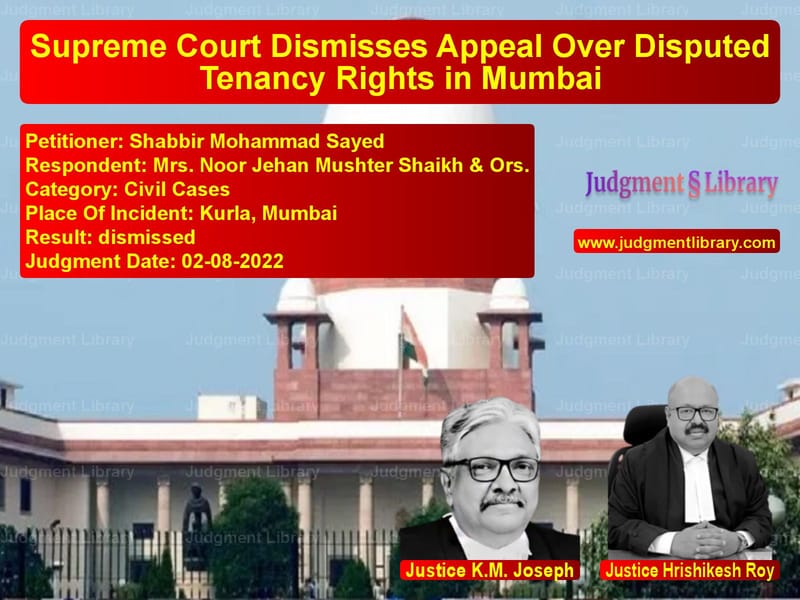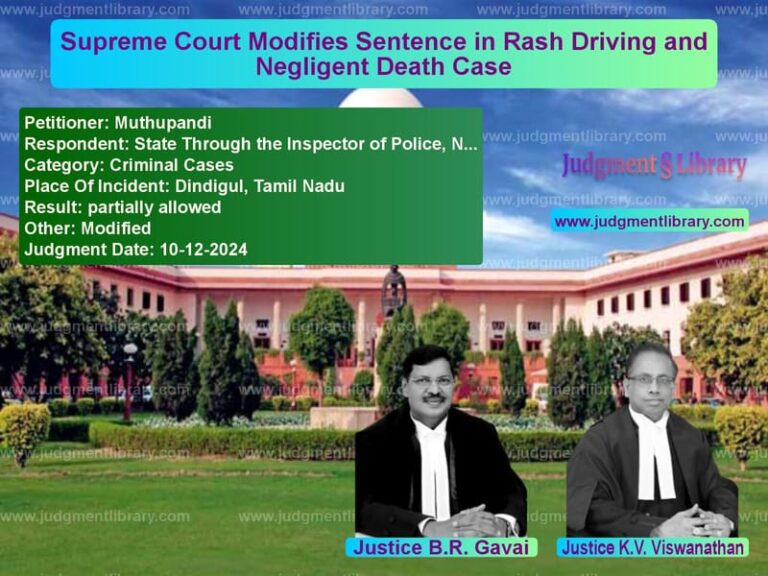Supreme Court Dismisses Appeal Over Disputed Tenancy Rights in Mumbai
The Supreme Court of India has dismissed an appeal challenging the eviction order against a tenant in a long-standing dispute over tenancy rights in Mumbai. The judgment reaffirms the application of the Maharashtra Rent Control Act, 1999, and clarifies the legality of lease assignments made during ongoing litigation.
Background of the Case
The dispute originated from a tenancy agreement concerning a property located at Visheshwar Bhuvan, Rajkotwala Compound, Pipe Road, Kurla (West), Mumbai. The plaintiff, Mrs. Noor Jehan Mushter Shaikh, claimed that she had legally acquired tenancy rights from the previous tenants for ₹85,000 but was denied possession by the landlord. The plaintiff filed a suit in 2013, which was initially dismissed by the Trial Court. However, the Appellate Court reversed this decision and granted tenancy rights to the plaintiff.
During the pendency of the appeal, another individual, Shabbir Mohammad Sayed, claimed that he had acquired rights to the same property through an assignment made by a third party on January 24, 2014. When the execution of the eviction order began, he filed an application under Order XXI Rule 97 of the Code of Civil Procedure (CPC) to resist eviction, which was rejected by the Execution Court, the Appellate Court, and subsequently by the High Court.
Arguments Before the Supreme Court
Petitioner’s Arguments (Shabbir Mohammad Sayed)
- The petitioner contended that he had legally acquired tenancy rights from a previous tenant and was unaware of the ongoing litigation.
- He argued that the transfer of leasehold rights in his favor was valid under a contractual agreement with the existing tenant and the landlord.
- He challenged the validity of the eviction decree, claiming that the execution was collusive and intended to dispossess him unfairly.
Respondent’s Arguments (Mrs. Noor Jehan Mushter Shaikh)
- The respondent argued that the petitioner had no legal right to the premises as the transfer of tenancy occurred during ongoing litigation, violating Section 52 of the Transfer of Property Act.
- She emphasized that the decree passed in her favor had already been confirmed by multiple courts and that the petitioner was attempting to obstruct execution through fraudulent claims.
- She pointed out that the agreement relied upon by the petitioner was unregistered and did not confer any legal rights.
Supreme Court’s Observations
The Supreme Court examined the legal validity of the lease assignment and the applicability of tenancy laws in Maharashtra. It noted:
“The transfer of tenancy rights during the pendency of an appeal is subject to the doctrine of lis pendens. Any such transaction made in violation of Section 52 of the Transfer of Property Act cannot be legally recognized.”
The Court further stated:
“The petitioner’s claim is based on an unregistered lease agreement, which is inadmissible under the Maharashtra Rent Control Act, 1999. The agreement is void and cannot override the decree passed in favor of the respondent.”
The Court rejected the petitioner’s argument that the lease was validated through the landlord’s ratification, clarifying:
“Ratification requires explicit consent and knowledge of the previous transaction. The landlord’s agreement does not mention the petitioner’s claim, and there is no evidence to support the assertion that the lease was ratified.”
Supreme Court’s Verdict
The Supreme Court ruled against the petitioner and upheld the eviction order, stating:
- The transfer of tenancy rights was unlawful as it was made during ongoing litigation.
- The petitioner had no valid legal claim under the Maharashtra Rent Control Act, 1999.
- The execution of the eviction order should proceed without further delay.
Impact of the Judgment
This ruling has significant implications for tenancy disputes in Mumbai:
- It reaffirms the doctrine of lis pendens, ensuring that transactions made during litigation do not affect the rights of the original parties.
- It upholds the requirement for proper registration of lease agreements to establish valid tenancy rights.
- It prevents individuals from obstructing execution proceedings through fraudulent lease transfers.
By dismissing the appeal, the Supreme Court has reinforced the legal framework protecting bona fide tenants while preventing misuse of property laws.
Petitioner Name: Shabbir Mohammad Sayed.Respondent Name: Mrs. Noor Jehan Mushter Shaikh & Ors..Judgment By: Justice K.M. Joseph, Justice Hrishikesh Roy.Place Of Incident: Kurla, Mumbai.Judgment Date: 02-08-2022.
Don’t miss out on the full details! Download the complete judgment in PDF format below and gain valuable insights instantly!
Download Judgment: shabbir-mohammad-say-vs-mrs.-noor-jehan-mush-supreme-court-of-india-judgment-dated-02-08-2022.pdf
Directly Download Judgment: Directly download this Judgment
See all petitions in Property Disputes
See all petitions in Landlord-Tenant Disputes
See all petitions in Judgment by K.M. Joseph
See all petitions in Judgment by Hrishikesh Roy
See all petitions in dismissed
See all petitions in supreme court of India judgments August 2022
See all petitions in 2022 judgments
See all posts in Civil Cases Category
See all allowed petitions in Civil Cases Category
See all Dismissed petitions in Civil Cases Category
See all partially allowed petitions in Civil Cases Category







